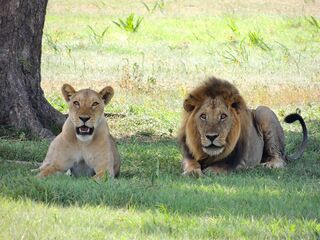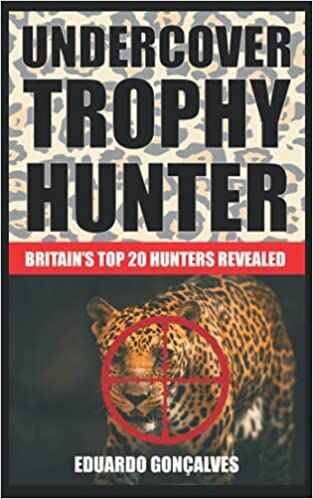Media
Trophy Hunters: A Rare Inside View of What Makes Them Tick
A new book details why Britain's top 20 trophy hunters kill for sport and fun.
Posted July 11, 2021 Reviewed by Abigail Fagan
Key points
- The book "Undercover Trophy Hunter" explains the psychology of trophy hunting through the words, thoughts, and feelings of hunters themselves.
- Learning why trophy hunters do what they do could lead to identifying other activities that satisfy their needs.
- A 2021 opinion poll found that 85 percent of UK voters wanted hunters to be prohibited from bringing hunting trophies into the UK.
“Eduardo presents the hard facts, meticulously researched and providing compelling evidence that the days of the great White Hunter should be brought to a close” –Jane Goodall
Eduardo Gonçalves is an award-winning conservationist, campaigner, and investigative journalist. He also is recognized as the world's leading authority on the so-called "sport" of trophy hunting, and in 2018 he founded the Campaign to Ban Trophy Hunting (CBTH). In 2019, the UK government agreed to introduce a ban on trophy imports which is due to be debated in Parliament later this year. Because of his tireless efforts and three other books, he has been described by the Daily Mail as "Britain's most prominent anti-hunting activist".1

Given his non-stop schedule and his global stature, I'm pleased that Eduardo could take the time to answer a few questions about his fourth and unique book called Undercover Trophy Hunter: Britain's Top 20 Hunters. I was troubled by the words hunters use to describe why they enjoy intruding into the lives of other animals and killing for fun and how they view the animals they kill for the thrill of it.2
Previous research has shown that trophy hunters' "pleasure smiles" are greater when they pose with large "dangerous" corpses. Trophy also hunting is pretty pricey and hunters will pay more to kill large-bodied carnivores. For many of them part of why they hunt is to show off and let others know they can absorb the cost. The bottom line is that some people get pleasure out of killing another animal when they really don't have to do it. Clearly, being beautiful does nothing to save the lives of these charismatic animals who are brutally slaughtered for fun, bragging rights, and to celebrate birthdays.
Here's what Eduardo had to say about his riveting look into the why's and how's of trophy hunting by 20 men and how they describe their exploits.3
Marc: Why did you write Undercover Trophy Hunter?
Eduardo: Undercover Trophy Hunter is very different from my previous books on the subject. I decided to go "undercover" because I wanted to get to know trophy hunters close up and get them to open up to me about what they had done and what they felt about it. The book tells the story of 20 of Britain’s leading hunters and their hunts.

There is a major debate going on in the UK about the government’s proposed trophy ban, yet little is known about the animals British trophy hunters like to shoot or what happens to those animals.
We often hear hunters telling the media rehearsed lines about how their sport is "conservation," yet when I read their forums they never say this–they just talk about the thrill. So I wanted to share what really motivates them so that people had a true picture of what is going on.
How does your book relate to your background and general areas of interest?
I used to be an investigative journalist and worked on stories that exposed things powerful interest groups didn’t want people didn’t know. The hunting industry is enormously powerful and well-funded, and nobody has previously penetrated their armour and told the real story behind the PR. I wanted to introduce readers to actual trophy hunters and what they really think.
As well as being a conservationist I have a background in criminology, so I also wanted to try to understand the mentality of people who engage in this behaviour and the issues it raises.
Who is your intended audience?
The book is aimed primarily at UK policymakers. I also wanted it to be a resource for the media that are reporting the issue so they have a fuller picture of the issue. It is a book that will hopefully be of great interest to psychologists and criminologists in providing new insights into what motivates this type of behaviour. It will interest all those concerned about conservation and animal welfare. It is the first time the stories of hunters have been openly told.
It is also the first time the incredible suffering experienced by animals targeted by trophy hunters is revealed. Many of us know Cecil the lion was left to suffer for hours after being wounded by Walter Palmer. However, official data and the stories in this book show this is the norm rather than the exception. Trophy hunting is not just a serious issue of ethics, but is also a major animal welfare issue too.
What are some of the topics you weave into the text and what are some of your major messages?
The first thing that struck me was how casually British hunters described the terrible wounds they inflicted on animals. They say things such as “Bright red blood was sprayed everywhere with pieces of tissue mixed in;” “My bullet smashed through the rear leg removing most of the bone and destroying muscle;” and “There was a pleasing amount of blood. We found intestines caught on the thorns.”
Some seem to take pleasure from this. One said: “I heard the smack of a hit and saw it go down on its side, legs in the air. I was grinning.” Another wrote that “I squeezed off the round and heard the satisfying thwack of the round hitting home.”
Because they thought they were talking to a fellow trophy hunter, they boasted to me about their "achievements." One of them said nonchalantly: “I have done 33 safaris in Africa. I’ve shot very good leopard. I’ve shot lion. I’ve shot very good elephant. I shot a 27-inch Black Rhino.” Another excitedly informed me: “I shot a monster leopard end of last season!”
They also speak of the thrill and the enjoyment. One of them joked: “We grab a few beers and have a bit of fun shooting the monkeys.” Others confessed: “You see something and you get all adrenaline over it and you pay anything for it” or that “Shooting them out of trees with bows (was) really cool, really fun!”
Are you hopeful that things will change for the better as people continue to learn about trophy hunting?
I hope this book gives policymakers and the public a new and essential insight into the minds of hunters and their real motivations. I think there are very serious moral questions and psychological and social issues we need to address.
References
In conversation with Eduardo Gonçalves.
Notes
1) My other conversations with Eduardo can be read in Trophy Leaks: A Behind the Scenes Exposé of Killing For Fun, Trophy Hunting: A Detailed Exposé of the Extinction Industry, and Trophy Hunters Exposed: Inside the Big Game Industry. In an editorial, The Times of London wrote that with his previous book Trophy Leaks, “Mr Gonçalves has done the government and the world a service”.
2) Killing for fun surely is not a way to interfere with or to "nudge nature", the topic of my last essay on the seminal work of environmental philosopher Paul Taylor who argues that it's best to leave other animals alone so that they can live out their natural lives. Ironically, it turns out that one of the taxidermists who serves trophy hunters in the UK also is named Paul Taylor. (See pp. 143ff of Undercover Trophy Hunter.)
3) Women also trophy hunt. See, for example, Trophy Hunter Boasts: The More You Hate, the More I Kill.
Bekoff, Marc. Trophy Hunters' Smiles Show How Much They Like to Kill.
_____. Trophy Hunters Pay More to Kill Larger-Bodied Carnivores.
_____. Why Men Trophy Hunt: Showing Off and the Psychology of Shame.
_____. Do Some People Simply Like to Kill Other Animals?
_____. Beauty Is More than Skin Deep—and Helps Animals Survive.
_____. Should We "Nudge Nature" to Help Animals Save Themselves?
Darimont, Chris, Codding, Brian F., and Hawkes, Kristen. Why men trophy hunt. Biology Letters, 13 (3), 2017.




